UT Theatre and Dance premieres ‘In Sisters We Trust, Or My F*cked Up American Girl Doll Play’
October 27, 2022
Eight women walk across the stage, sporting outfits reminiscent of a popular childhood toy — American Girl dolls. Many audience members associate the dolls with traditional lessons about womanhood, but for playwright Justine Gelfman, the dolls represent stereotypes and harmful narratives.
“This play is about a glitchy, glossy millennial pink hellscape,” Gelfman said. “It’s looking at how two well-intended but harmful companies use the illusion of feminist progress to rebrand, repeat and profit off mistakes of the past.”
UT Theatre and Dance premiered the first ever production of “In Sisters We Trust, Or My F*cked Up American Girl Doll Play” on Oct. 20 at the B. Iden Payne Theatre. Gelfman uses satirical comedy and tech-savvy set design to stimulate commentary on white feminism and exclusivity. With its predominantly student cast, the show highlights the experiences of women of color and discusses the harm of “sweeping things under the rug.”
In collaboration with Susanna Wolk, Gelfman said she wrote the play over about five years. The two-act play draws inspiration from two parts of the writer’s past — her childhood memories of American Girl dolls and her employment at a collaborative workspace for women in Brooklyn. Gelfman said she wanted to emphasize the inherent exclusivity of both companies despite their intentions of empowering women.
Gelfman, who is white, said she valued input from the cast members who are from communities being represented on stage, and their feedback played an important role in the script’s revisions.
“We (sat) down during the rehearsal process and outlined how we felt (about the characters), and if there was something we thought was too far, they would alter it,” cast member Chantell Gonzalez said. “They made it a really welcoming and good environment to speak and feel comfortable.”
Gonzalez, a theatre and dance sophomore, played the American Girl doll Josefina, the production’s only Hispanic doll. Gonzalez said while being the only person representing the Hispanic community was a daunting task, she found a good balance between embracing Josefina’s Latina culture and challenging stereotypes.
“I wanted to do (Josefina) justice and didn’t want to stray far from what the playwright intended, but I also didn’t want her to stray from what I know are Hispanic cultural values,” Gonzalez said. “It’s definitely scary to know you’re representing the whole community, but it’s also empowering.”
Cast member Mack Thornton, a theatre and dance sophomore, said they also faced challenges with representing the experiences of people of color. Thornton played Addy, the first Black American Girl doll, and Jordan, a higher-up at the coworking company and the only Black woman employed there. Thornton said they hope audience members will better understand the experience of marginalized communities after witnessing it on stage.
“I want the audience to leave knowing they learned something new, specifically for people who can’t relate to the POC experience,” Thornton said. “For people who can relate, I want them to feel seen, satisfied and represented.”
Gelfman and the cast members said they’re grateful to see this story come to life and encouraged people to attend the show before its final Oct. 29 performance. Gonzalez said she hopes after watching the show, viewers better understand the challenges underrepresented women face.
“Theatre and arts have a beautiful way of being able to push a statement forward and can help you understand that we need to reanalyze certain things in the world,” Gonzalez said. “There’s so much power in what you put out creatively.”












